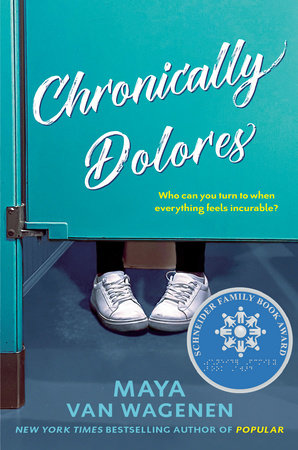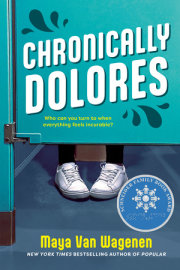“Naranja dulce limón partido dame abrazos que yo te pido.” Tía Vera drummed her fingers on the steering wheel as she sang. Now and then, when the road required more focus, she switched to humming and leaned forward, squinting through her cat-eye glasses. Her rosary swung back and forth from the rearview mirror, almost taking out the plastic St. Christopher suction-cupped to the dashboard.
“Si fueran falsos mis juramentos dame los besos que yo te dí.” My aunt’s car didn’t have working air-conditioning, because why would she need some expensive nonsense like that when there were perfectly good windows we could crank down—halfway? Somehow, remarkably, the sixty-five-year-old wasn’t even sweating. Her makeup—red lips and thick foundation one shade too light for her brown skin—stayed perfectly still, held there by her monumental willpower. I, on the other hand, was not so lucky. I was sure that, should this drive take too much longer, police officers would find me melted, my flesh permanently fused to the rainbow granny-square seat cover.
The poor kid, they’d say.
Dead one week into summer vacation. A real tragedy. Tía Vera hit a pothole, and I gasped, clutching the door with white knuckles. I wasn’t the only one struggling. St. Chris (and by extension the piggybacking Christ Child) took a tumble to the floor of the driver’s side, rolling under the pedals. Tía Vera mumbled something in Spanish as she fished around for the figure, taking her attention away from the road.
“Tía, watch out!” I shouted as the car swerved.
“Aha!” she replied, returning the holy action figure to its rightful place and the vehicle to the correct lane. “Cálmate, mija. I’ve had this car for three decades—that’s more than twice as long as you’ve been alive—and I’ve never once had an accident.”
We drove in silence for a minute before she looked over at me, studying my expression of discomfort as I loosened the seat belt across my lap. “You’ve still got your affliction?”
I sighed, shifting my hips into the seat and looking out the half-open window. My
affliction. Crusty rodent number one. “Interstitial cystitis is chronic, Tía. Ongoing. Persistent. Long-lasting. Occurring over an extended period of time. So yes, I still have my affliction.”
“Ay, niña, you know I meant nothing by it,” she chided softly.
Tía Vera’s eyebrows touched in the middle like two fuzzy caterpillars kissing. My brother Mateo had those same eyebrows, and my dad, and I guess I would too if Shae Luden hadn’t discovered waxing strips back in sixth grade and insisted we learn to use them. I could picture us in her parents’ huge master bath, leaning over the double vanity, goading each other in the mirror to finally rip away the paper. Thinking about Shae made my throat tense, like when you swallow too hard and pull a muscle.
“Vitalis of Assisi,” Tía Vera said.
“What?” I asked, realizing I’d filtered out my aunt’s chatter.
“I was telling you I looked it up. Vitalis of Assisi, that’s the patron saint of”—she lowered her voice to protect my modesty—“pee-pee problems.”
I pursed my lips. “Tía, I went to church, like you asked. But going once doesn’t mean I believe in any of . . .” I pointed to the poorly painted martyr on the dashboard. “This.”
Tía Vera put her hands up, letting go of the wheel. “Claro que sí, of course. I’m grateful for you indulging me. The viejitas are always bragging about their children and grandchildren, and now they know that I have the most beautiful niece.” She lowered her hands and glanced at me with the glimmer of a smile. “And you never know. Belief might come later.”
It wasn’t going to do any good to argue. The car rolled to a stop in the side alley next to Mendoza Printing. “You coming up?” I asked, opening the door and extracting my bare thighs from the drenched seat cover.
Tía Vera tilted her head. “Is your mother home?”
I checked the time on my phone. The lock screen was a picture of Shae and me from a couple summers ago. We were sitting on the swim deck of her parents’ boat, grinning at the camera. Shae still had braces back then, and I had a line of way-too-short bangs, which she’d cut the night before. It had seemed like a brilliant idea at the time. I quickly clicked the screen dark. “Friday at six thirty?” I answered, trying to remember Mom’s schedule for this week. “Maybe. If not, she will be soon.”
“Then no thank you, mija,” Tía Vera answered, leaning over the console for the mandatory kiss on the cheek. I ducked back into the car to oblige. “Anyways, I have to get home in time for
Rosa Mi Vida,” she continued. “See you Sunday.”
“See you Sunday.”
I watched my aunt’s red ’87 Ford Escort careen down the alley, narrowly avoiding the corner of our big metal dumpster.
St. Christopher sure has his work cut out for him, I thought, pulling out my keys and turning around to face the mendoza printing sign.
My parents rented a two-story walk-up downtown. That was how I always described it to people, because it sounded a lot nicer than the reality. The skinny brick building was wedged between two neighbors: a barbershop and a sketchy ice cream parlor that Mateo and I were sure doubled as a front for some kind of money-laundering scheme. Mom told us that was crazy, but they only offered six flavors, and one of them was black licorice, so how else could they stay in business?
Our rental price included the ground-floor storefront and an upstairs apartment accessible only by a shockingly noisy set of green metal stairs on the outside of the building. Dad said we were lucky the stairs were so loud. It was like having a free alarm system.
“Hey, you,” my brother, Mateo, said. He’d opened the door before I had time to reach the top step.
I pushed past him. “Move, have to pee.”
“Rude.”
Copyright © 2024 by Maya Van Wagenen. All rights reserved. No part of this excerpt may be reproduced or reprinted without permission in writing from the publisher.








